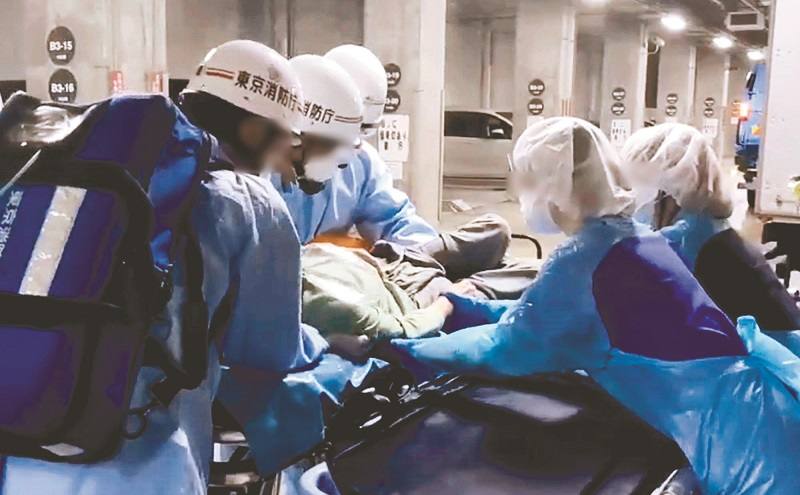COVID-19 deaths conspicuous among elderly not diagnosed as severe cases

A COVID-19 patient is taken to Showa University Hospital on Aug. 10. Parts of this photo have been obscured.
20:00 JST, September 4, 2022
Deaths from COVID-19 are at their worst level so far amid the seventh wave of the novel coronavirus pandemic. The number of people who have contracted the highly infectious BA.5 omicron subvariant is rapidly increasing, and fatalities are notably prevalent among elderly people who were never diagnosed as having a severe case of COVID-19 but whose chronic illnesses worsened or who grew physically weak.
Various factors
“Few people are dying from pneumonia caused by the infection,” said Hironori Sagara, director of Showa University Hospital, describing changes in the COVID-19 situation amid the seventh wave.
About 40 people with COVID-19 are currently inpatients at the hospital in Tokyo. Only a few are on ventilators due to breathing difficulties.
Following their infection with the coronavirus, many of the patients have seen their chronic ailments worsen, including cancer and heart and kidney diseases, or grown weak due to dehydration.
COVID-19 cases exploded across the nation in the seventh wave, with the daily tally hovering above the 200,000 mark from late July. Deaths have also increased.
The Health, Labor and Welfare Ministry counts people who died after being infected with the virus as COVID-19 deaths. By this reckoning, 7,295 people died of COVID-19 in August, the highest monthly figure so far. In the week to Aug. 31, there was an average of 285 fatalities daily, compared to 237 during the highest week in the sixth wave.
However, the number of serious COVID-19 cases is about 40% of the sixth wave’s peak. Under the government’s criteria, patients on ventilators or extracorporeal membrane oxygenations (ECMO), or who are being treated in such facilities as intensive care units, are being regarded as having severe cases of COVID-19.
Unlike previously dominant variants such as delta, the omicron variant is less likely to cause pneumonia. Progress since May with the fourth round of COVID-19 vaccinations, mainly among elderly people, is also seen as a factor behind the decline in serious cases.
90% of deaths among 70 or older
However, the novel coronavirus affects various organs. Especially among elderly people, a loss of physical strength due to fever can be fatal. According to the ministry, people 70 or older accounted for 70% of deaths during the fifth wave last summer when the delta variant was dominant, and cases of pneumonia caused by COVID-19 were conspicuous.
Now, however, people aged 70 or older account for 90% of COVID-19 deaths.
“Triggered by infection with the coronavirus, a growing number of elderly COVID-19 patients are at risk of death due to worsened chronic diseases, or from aspiration pneumonia, in which the ability to swallow weakens due to reduced psychical strength,” said Norio Omagari, director of the Disease Control and Prevention Center of the National Center for Global Health and Medicine.
As of Aug. 21, more than 90% of people who died in Osaka Prefecture after being infected with the virus in the seventh wave had not been diagnosed with a severe case of COVID-19. Takaji Wakita, director general of the National Institute of Infectious Diseases and the head of an advisory panel for the health ministry, believes this trend is occurring around the country.
In addition, many cluster infections have occurred at elderly facilities due to the outbreak of the highly infectious BA.5 subvariant. According to the government’s tally, 2,888 clusters occurred throughout the nation in the four-week period from Aug. 1. This is 80% higher than in the sixth wave, pushing up the COVID-19 death toll.





